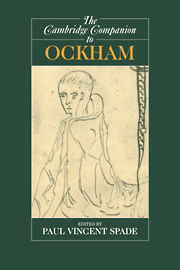Book contents
- Frontmatter
- Introduction
- 1 The Academic and Intellectual Worlds of Ockham
- 2 Some Aspects of Ockham's Logic
- 3 Semantics and Mental Language
- 4 Is There Synonymy in Ockham's Mental Language?
- 5 Ockhams' Nominalist Metaphysics
- 6 Ockham's Semantics and Ontology of the Categories
- 7 Ockham's Philosophy of Nature
- 8 The Mechanisms of Cognition
- 9 Ockham's Misunderstood Theory of Intuitive and Abstractive Cognition
- 10 Ockham's Ethical Theory
- 11 Ockham on Will, Nature, and Morality
- 12 Natural Law and Moral Omnipotence
- 13 The Political Writings
- 14 Ockham on Faith and Reason
- 15 Ockham's Repudiation of Pelagianism
- Bibliography
- Citations
- Index
5 - Ockhams' Nominalist Metaphysics
Some Main Themes
Published online by Cambridge University Press: 28 May 2006
- Frontmatter
- Introduction
- 1 The Academic and Intellectual Worlds of Ockham
- 2 Some Aspects of Ockham's Logic
- 3 Semantics and Mental Language
- 4 Is There Synonymy in Ockham's Mental Language?
- 5 Ockhams' Nominalist Metaphysics
- 6 Ockham's Semantics and Ontology of the Categories
- 7 Ockham's Philosophy of Nature
- 8 The Mechanisms of Cognition
- 9 Ockham's Misunderstood Theory of Intuitive and Abstractive Cognition
- 10 Ockham's Ethical Theory
- 11 Ockham on Will, Nature, and Morality
- 12 Natural Law and Moral Omnipotence
- 13 The Political Writings
- 14 Ockham on Faith and Reason
- 15 Ockham's Repudiation of Pelagianism
- Bibliography
- Citations
- Index
Summary
The first thing one learns about William of Ockham's philosophy is usually that he was a “nominalist.” But sometimes it is not explained just what Ockham's nominalism was. For medieval nominalism, like its modern namesake, took many sometimes surprising forms.
At least two distinct themes in Ockham’s metaphysics have been called nominalism: (1) his rejection of universals and their accoutrements, like the Scotist formal distinction, and (2) his program of what can be called “ontological reduction,” namely his eliminating many other kinds of putative entities, whether universal or not, and in particular his cutting the list of real ontological categories from Aristotle’s ten to two: substance and quality (plus a few specimens of relation in theological contexts). Although I will say something about both themes in this chapter, the emphasis will be on the second.
These two themes are independent of one another. One might deny the reality of universals, as Ockham did, yet maintain that individual entities are needed in more or fewer categories. Thus, John Buridan rejected universals as resolutely as Ockham ever did but thought there are real, irreducible entities in the category of quantity, which Ockham denied, as well as in the categories of substance and quality. Conversely, one might think some of the categories in Aristotle’s list can be reduced to others while insisting that universals, not just individuals, are needed in some or all the remaining categories. Thus, Ockham’s contemporary Walter Burley thought the categories could be reduced to the same list of three Buridan allowed, but he was a realist about universals.
- Type
- Chapter
- Information
- The Cambridge Companion to Ockham , pp. 100 - 117Publisher: Cambridge University PressPrint publication year: 1999
- 13
- Cited by



